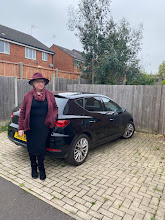Part 2.
Later on, the afternoon proved to us what we had always suspected: the French are a nation of form-fillers. Eventually, I was issued with un attestation from the Caisse Primaire d’Assurance Maladie (CPAM) attesting to the fact that we were both now eligible for French medical benefits. It seemed that in practice, all French citizens pay up front for their medical costs and receive some back. The normal ratio is one hundred percent up front, and five days later, seventy percent of the cost is refunded directly to your French bank account. We still didn’t understand when we might receive our carte vitale, that all-important card that would give us credibility in our new country, but in the meantime I suppose the attestation will have to do. Mind you my inner neuroses were working non-stop. I could visualise that nightmare scenario of our lying in the road somewhere waiting for the ambulance to arrive, then groggily trying to explain to the trauma team just why we hadn’t a carte vitale but that we had got a vital piece of paper that was probably in my handbag somewhere!
Of course, if we hadn’t been residents and merely visiting the country, we could have applied for a CEAM card, which gives visitors the benefits of European-wide health insurance. But we had to come to terms with it. We were now bone-fide residents and must deal with the issues involved.
On the plus-side, it was clear that the standard of hospital treatment in France is second to none, and we were told there are virtually no waiting lists for operations or hospital beds. Apparently public and private medicine operate alongside one another with no difference in the standard of care between them. Everyone tells us that the quality of health care and facilities in France is among the best in the world, and much private treatment costs considerably less than back home. If ever we develop cataracts, for example, the cost of private treatment would be around nine hundred pounds sterling here, compared with three thousand pounds in the UK. Enough said.
However, our neighbour Franck told us that la France has long been a nation of hypochondriacs, famously satirised by Molière in Le Malade Imaginaire. He told us that he reckoned the French visit their doctors more often than most other Europeans and buy large quantities of medicines, health foods and vitamin pills. This must be why, in nearly every run-down dilapidated village we have driven through, the pharmacie looks the most modern, expensive building in the place.
H looked thoughtful. ‘The French must be hypochondriacs; I mean, everywhere I look are adverts for Piles.’
‘No!’ I told him horrified. ‘Those aren’t adverts for haemorrhoids; piles is the French word for batteries!’ I just knew that this foreign language thing would get us into trouble.
When Franck told us that the incidence of heart disease in France is among the lowest in the world because of the high consumption of red wine, my resident alcoholic’s face lit up. Well, it would, wouldn’t it?
We both wondered, though, why the NHS couldn’t operate in the same manner as the French health service. It seems obvious to everyone except the UK government that the increasing size of the population can no longer sustain a completely free health service. Some sort of charge needs to be levied on all wage-earners. We thought long and hard about the difficulties we had always experienced with English hospitals. The problem seems to lie not in the staff, who always appear surprisingly cheerful in the circumstances, but with the fabric of hospital buildings built in another time with a different set of values. No longer are staff in English hospitals prepared to scrub floors on their hands and knees, preferring modern polishing machines instead. Hospital clinicians seem conditioned to rely on modern antibiotics to kill germs absorbed internally by their patients, rather than the preventative, old-style carbolic administered liberally on floors and walls to disinfect the building rather than the patient. I just don’t know why the British put up with such a system. Closing all the old Victorian hospitals and building new, purpose-built buildings capable of maintaining high levels of surgical cleanliness would be a start. The hospitals everyone loves are not the bricks and mortar that hold them together, but the people who actually serve within them. These caring people will still be there in newer, cleaner and more hygienic surroundings. It is the very least staff should expect and what patients deserve, particularly in times of crisis. And if all this requires wage-earners to contribute more, then so be it. It would be worth it.
......to be continued next Sunday
Subscribe to:
Post Comments (Atom)


















No comments:
Post a Comment